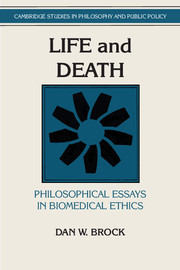Book contents
- Frontmatter
- Contents
- Sources and acknowledgments
- Introduction
- PART I PHYSICIANS AND PATIENTS MAKING TREATMENT DECISIONS
- PART II LIFE-AND-DEATH DECISIONS IN THE CLINIC
- PART III LIFE-AND-DEATH DECISIONS IN HEALTH POLICY
- 9 The value of prolonging human life
- 10 Quality of life measures in health care and medical ethics
- 11 The problem of low benefit/high cost health care
- 12 Justice and the severely demented elderly
- 13 Justice, health care, and the elderly
- 14 Truth or consequences: The role of philosophers in policy-making
- Index
14 - Truth or consequences: The role of philosophers in policy-making
Published online by Cambridge University Press: 05 June 2012
- Frontmatter
- Contents
- Sources and acknowledgments
- Introduction
- PART I PHYSICIANS AND PATIENTS MAKING TREATMENT DECISIONS
- PART II LIFE-AND-DEATH DECISIONS IN THE CLINIC
- PART III LIFE-AND-DEATH DECISIONS IN HEALTH POLICY
- 9 The value of prolonging human life
- 10 Quality of life measures in health care and medical ethics
- 11 The problem of low benefit/high cost health care
- 12 Justice and the severely demented elderly
- 13 Justice, health care, and the elderly
- 14 Truth or consequences: The role of philosophers in policy-making
- Index
Summary
My reflections here are based principally on my experience during the 1981–82 academic year as staff philosopher on the President's Commission for the Study of Ethical Problems in Medicine, as well as participation in various capacities in other policy-making or advising bodies in biomedical ethics at both state and national levels. My central thesis is that there is a deep conflict between the goals and constraints of the public policy process and the aims of academic scholarly activity in general and philosophical activity in particular. I shall support this thesis by developing several related aspects of the conflict.
Truth is the central virtue of scholarly work. Scholars are taught to follow arguments and evidence where they lead without regard for the social consequences of doing so. Whether the results are unpopular or in conflict with conventional or authoritative views, determining the truth to the best of one's abilities is the goal. In philosophy, especially, nothing is to be immune from question and criticism; all assumptions are open to and must withstand critical scrutiny. Now it would be silly to maintain that philosophers always succeed in this unconstrained quest for the truth, either in the sense that their quest is unconstrained or that they reach the goal of the truth. We often fail to recognize the problematic nature of particular assumptions or views and so fail to subject them to the criticism they deserve.
- Type
- Chapter
- Information
- Life and DeathPhilosophical Essays in Biomedical Ethics, pp. 408 - 416Publisher: Cambridge University PressPrint publication year: 1993
- 2
- Cited by



